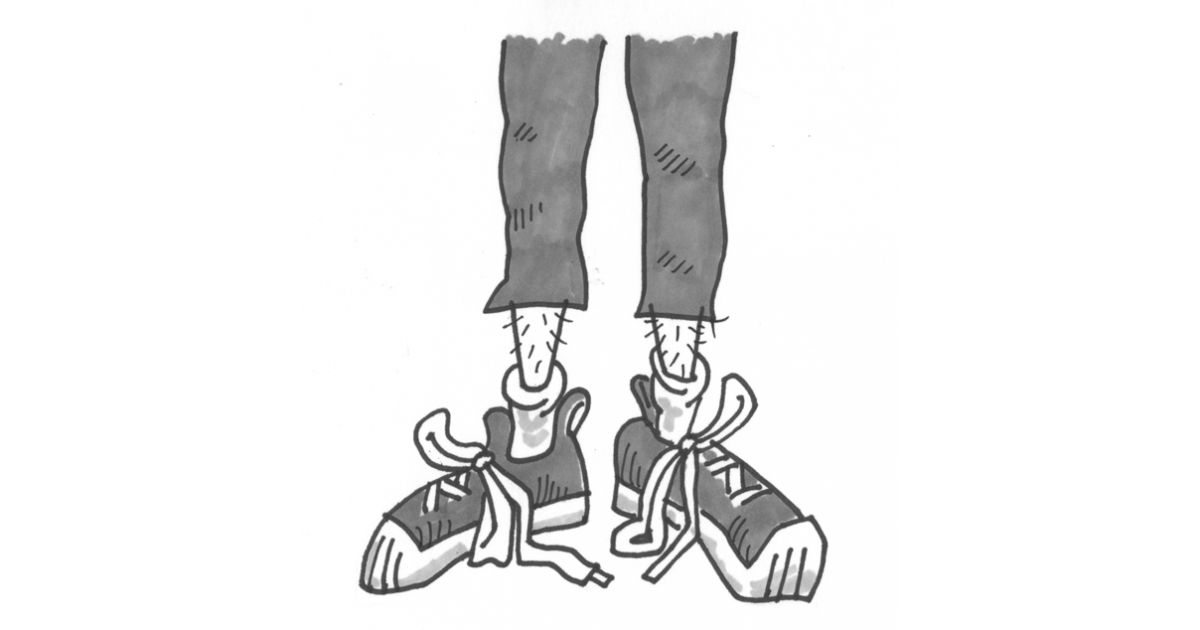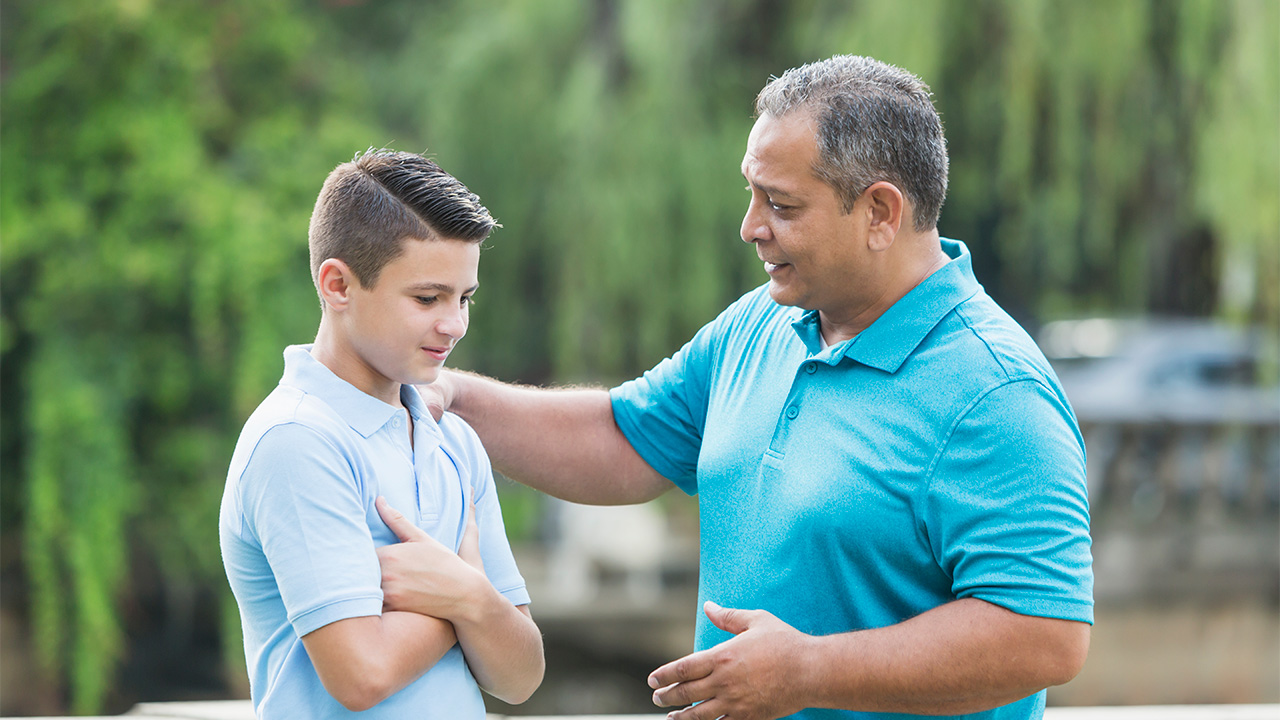Explore web search results related to this domain.

Will, Ruby and Grace are among those swapping their devices for basic phones, for five days.
Ruby acknowledges that having a break from her smartphone “has opened up more conversation” with her parents - and her mum, Emma, agrees the detox is having a positive impact on her daughter’s behaviour. “Ruby is pretty addicted to her phone, so it just gives her a chance to see what it was like when I was a teenager,” says Emma.Ruby dreams of becoming an actor. She says she spends way too much time on her phone, and often ignores her parents while scrolling through TikTok.One concerned parent said the move could result in their child getting "lost in the chaos"."I’m worried how I’ll cope,” he says. “I’ll now have to be sociable with my parents.”

I grew up in a big family, and my parents didn't discipline us. I decided to adopt an authoritative parenting style with my kids, and it works.
We channel both of our approaches through disciplinarian actions and kindness. This gives our parenting a higher purpose than just trying to keep the peace to get through the day as a family. I've thought about how I would parent my kids for decades. Even as a teenager, I saw how important it was to give attention to your children because my parents didn't always have the time to do so.I grew up seeing how constant chaos with no discipline didn't create the best environment. Some of my siblings lost faith in authority figures. I knew my future parenting style would incorporate more authoritative style, which has proven to be the best thing for my 5-year-old son and 8-year-old daughter.Evaluating my family's dynamics as a kid made me vow that my kids would always know there were consequences for poor choices. When my husband and I decided to have children, we discussed how we'd raise them. I wanted to parent them from a place of logic while prioritizing discipline in response to bad behaviors.Our parenting style encourages emotional stability while equally enacting the consequences that help our children grow into better versions of themselves. ... Don't get me wrong — I'm a softie deep down. Disciplining my children is hard.
Our teens need “Kind and Firm” parenting. Parenting that tells them, “I love you and respect you, and I also love and respect myself. Kind and Firm parenting creates balance, communication and respect within families. It is respectful to the teen, the parent and the situation at hand.
Our teens need “Kind and Firm” parenting. Parenting that tells them, “I love you and respect you, and I also love and respect myself. Kind and Firm parenting creates balance, communication and respect within families. It is respectful to the teen, the parent and the situation at hand.We’re adults, we’ve been there, done that….Now it is our teen’s turn to go through the process of growing up. This process is sometimes referred to as “individuation”. Individuating is a process that kids go through to become more of themselves, to become independent from their parents.It often looks like rebellion because it appears that they are doing everything possible to go against our values and our morals. What is important to us, as parents, may become a place of rebellion for our teens. By individuating they get to experience the other side, they get to experiment with life in a different way.The next time you are feeling challenged, provoked or threatened, take time to calm down and then try one of these Kind and Firm Parenting Tools: Talk with your teenager-not to, at, or for him or her.
Life for adolescents in Latin America ... development. Many adolescents in the region grow up in poverty and are often vulnerable to different forms of violence that occurs in many settings, including the home, with many parents condoning the use of violent discipline as means of ...
Life for adolescents in Latin America and the Caribbean is often challenging with obstacles that may interfere with their positive development. Many adolescents in the region grow up in poverty and are often vulnerable to different forms of violence that occurs in many settings, including the home, with many parents condoning the use of violent discipline as means of education.Effective parenting provides a powerful opportunity to influence adolescent development.develop parents’ skills to communicate respectfully with adolescents in a manner that respects their evolving capacities; support parents to employ positive, non-violent discipline techniques that rely on communicating expectations and setting parameters around adolescents’ behaviour;Adolescence is a period of rapid physical, social, sexual and psychological change. Parents play an essential role in influencing how they interact with this complex period of transition that shapes their development and identity.

Positive Parenting for Those Important Teen Years Adolescence is often a time of great stress and turmoil—not only for kids going through it, but for you, their parents as well. During the teen years, kids aggressively begin to explore a new sense of freedom, which often leads to feelings of resentment and powerlessness for parents who increasingly are excluded from their children's lives. This revised edition of Positive Discipline ...
Positive Parenting for Those Important Teen Years Adolescence is often a time of great stress and turmoil—not only for kids going through it, but for you, their parents as well. During the teen years, kids aggressively begin to explore a new sense of freedom, which often leads to feelings of resentment and powerlessness for parents who increasingly are excluded from their children's lives. This revised edition of Positive Discipline for Teenagers shows you how to break the destructive cycle of guilt and blame and work toward greater understanding and communication with your adolescents.Inside, you'll discover proven, effective methods for working with your teens. Over 1 million Positive Discipline books sold! "I highly recommend this book to parents, teachers, and all others who work with young people. It is one of the best books I have seen on helping adults and adolescents turn their conflict into friendship.Read 47 reviews from the world’s largest community for readers. Positive Parenting for Those Important Teen Years Adolescence is often a time of great stre…The is a must-have for parents of teenagers. ... Read part of it. ... The section on depression should entirely discredit this entire book. ... I disagreed with the first 30% of this book it seemed. But many chapters from the second half brought up some great points. ... Libro de consulta permanente de acuerdo a las diferentes etapas de un/a adolescente.


He thinks it gets “instant results.” I think it’s cruel.
What your husband is doing is not “effective” parenting; it is manipulative and abusive. You’ve already asked him to stop, and he hasn’t—now you need to tell him. Make sure he knows that this is a dealbreaker for you, and keep your eye out for any future “discipline” or behavior on his part that involves threatening your children in such a cruel way.This might sound silly to you, but I also think it’s worth praising whatever effort or improvement you see, whenever you can. While most tweens and teens won’t admit to wanting that positive recognition, many do appreciate and need it. Any time we can build our children up instead of tearing them down, it’s worth it.I have said as much to Evan and asked him to stop, but his answer is that it gets instant results, so he won’t “get rid of the most effective tool in the parenting box.” It may get the desired result, but I hate seeing my kids despondent on a routine basis and think what Evan is doing is cruel and psychologically harmful.It’s gross and frankly disturbing that your husband sees threatening the family dog as some kind of brilliant parenting hack. Even if you don’t believe he’d follow through with these threats, the kids apparently do, which is awful.

This finding has sparked a vast interest in studying adolescent brain growth, particularly in relation to typical mood swings, risk-seeking behavior, and impulsivity during the teenage years. It is important to understand that the discord between parents and teens often stems from adolescent ...
This finding has sparked a vast interest in studying adolescent brain growth, particularly in relation to typical mood swings, risk-seeking behavior, and impulsivity during the teenage years. It is important to understand that the discord between parents and teens often stems from adolescent brains not functioning like fully developed adult brains.We recommend Dr. Eichin Chang-Lim’s books Talking About Adolescence: Book 1: Anxiety, Depression, and Adolescent Mental Health and Book 2: Talking About Adolescence: Book 2: Supercharge Your Body and Brain Power. How To Stop Arguing With Your Teen: 10 Tips For ParentsParenting Teens Means Learning to Love Hard When They're Hard to Love · Dr. Eichin Chang-Lim is the author of the “Talking About Adolescence” series. She is passionate about promoting mental health awareness and helping teens live happy and fulfilling lives.The negative effects of harsh, strict discipline are vast. This parenting style harms relationships and has long-term consequences.
Teens need calm, firm discipline in order to thrive during adolescence. Learn how to be his success ambassador.
Frustrated parents go with angry teens like Labrador pups go with Clydesdale horses in Super Bowl commercials. And your story can have a happy ending, too. The secret formula lies in effective discipline.If you master a few core principles for setting rules like a boss, your teen will be a lot easier to manage. But first you need to understand the roots of her rebellion... As a rookie therapist, I was taught that adults from overly strict or overly permissive households generally want to raise their children in the opposite manner in which they were raised. The problem is both dynamics lead to black-and-white parenting. For example, if your folks were overly strict and/or harsh with discipline, it's not uncommon to rebel against rules, or become anti-authority when raising kids of your own.This parent overcompensates by indulging and doing everything for her teen. But without room to explore and make mistakes, Sara doesn't learn to problem solve and become independent. ... Reboot your parenting template. And sometimes this means starting anew with a fresh, clean, discipline slate.Call the host's parents and verify there's adult supervision, ask him to repeat the drinking rule, drive him to the party and/or pick him up, check his breath when the party's over. ... But the tantrum will be temporary. Teens crave structure, especially the defiant kids. They need to know there's a safety net to counter the lack of control they feel internally. Disciplining teens entails untold amounts of time, energy and grunt work.

Parenting can be the most rewarding work of adult life.

Your toddling child is now a teen who's learning to be an adult. Adolescence is an important part of the individuation process. How does parenting change?
ADOLESCENCE IS AN important part of the individuation process. During this time, teens try to find out who they are and separate from their parents. The problem is that most parents tend to do many things during this time that make situations worse instead of better.An excerpt from the Positive Discipline for Teenagers book by Dr. Jane Nelsen and Lynn Lott. REMEMBER WHEN YOUR teen was a baby just learning to walk? What a milestone. You didn‘t want to miss any of it, and you were very supportive and encouraging. You would take her little hands in yours and start walking along with her—but you knew you had to let go in order for her to walk by herself.It is also a time when you can explore your own unresolved teen issues. Every chapter in this book has such valuable information that it was difficult to decide which chapters should be at the beginning. We thought all of the chapters warranted at least first or second status. Therefore, read the chapters in any order that appeals to you, because all of them will help you retrain yourself so you can parent your teen more effectively—and with perspective.WE HOPE THAT you are operating in a kind, firm, and encouraging way. We know that going through the teen years can be like going through a war zone for both you and your teens and that it is easy for kindness and firmness to fall away and be replaced by less encouraging parenting methods.


I got to hike a large mountain this year, so I took my teen daughter. She almost quit halfway through; I debated whether I should push her anyway.
History is full of people who failed over and over again until they did something astonishing. As a parent, it's my job to provide a safe place where my kids can land after a failure. They need someone to tell them that it's OK and to talk with them about what they learned.I faced a hard parenting decision during our hike and I'm still not sure I handled it correctly.Sometimes, I'd like this parenting job to come with some definite answers. I feel like I'm winging it. I have no idea if I'm doing it right.But I am confident that I did the right thing in supporting her in her time of need, and that's all I need to do as a parent.
A positive approach to discipline for pre-teens and teens includes communication, relationships and agreed limits. It guides teens towards positive behaviour.
On top of this the teenage brain goes through massive growth and development during adolescence. As a result, teenagers try new things but don’t always make good decisions. They’re more influenced by peers.You can talk with your child about your agreement and hear what they think should happen as a consequence of breaking it. Often teenagers will be much harsher than their parents.To check whether your family rules are realistic and reasonable, you could talk with other parents who have children of the same age.A positive approach to discipline helps pre-teens and teenagers:


Otherwise, the "Real Time" host notes, your sons are going to turn to "meathead misogynist influencers" like Andrew Tate The post Bill Maher Wants ‘Trad Dads’ to Discipline Kids and Stop Gentle Parenting for Father’s Day | Video appeared first on TheWrap.
In Friday’s “New Rules” segment on “Real Time With Bill Maher,” the host slammed “gentle parenting,” calling for more discipline with children.“Meanwhile, in this country, parents strap leashes to their kids like they’re escorting a serial killer on ‘Con Air,'” the host quipped. “But what happens, what always happens when uber-liberal bulls–t goes too far, is it produces a far more damaging counter-reaction,” Maher added. “In the absence of traditional fathers, teenage boys these days are turning to meathead misogynist influencers like Andrew Tate.”He added that there has been concern about parents overindulging children as long as he’s been doing a show, which dates back to the early 1990s, but lamented that even after discussing “trophy syndrome,” “helicopter parenting” and “bulldozer parenting,” “it hasn’t gotten better.”The host complained about lax parenting, which he sees when being in the vicinity of parents and kids in public.

Kate Bulkeley's pledge to stay off social media in high school worked at first. Gabriela Durham, a high school senior in Brooklyn, says navigating high school without social media has made her who she is today. Not having social media has made her an “outsider,” in some ways.
But there is a growing realization among experts that the COVID-19 pandemic fundamentally changed adolescence. As youth coped with isolation and spent excessive time online, the pandemic effectively carved out a much larger space for social media in the lives of American kids. No longer just a distraction or a way to connect with friends, social media has matured into a physical space and a community that almost all U.S. teenagers belong to.With the damaging consequences of social media increasingly well documented, some parents are trying to raise their children with restrictions or blanket bans. Teenagers themselves are aware that too much social media is bad for them, and some are initiating social media “cleanses” because of the toll it takes on mental health and grades.That is significantly less than most, according to a 2023 Gallup poll that found over half of U.S. teens spend an average of five hours each day on social media. She uses her phone mainly to make calls, text friends, check grades and take photos. She doesn’t post or share pictures, one of her parents’ rules.It’s where many kids turn to forge their emerging identities, to seek advice, to unwind and relieve stress. It impacts how kids dress and talk. In this era of parental control apps and location tracking, social media is where this generation is finding freedom.
The goal of discipline is to gain more control over your kids -- without being too controlling. Tweens and teens push boundaries to see how their parents will respond. It's important to establish clear rules, and to have consequences for breaking those rules.
You want your children to do the right things, but disciplining teens isn't easy. When they talk back, you can't just put them in a time-out like you did when they were toddlers. Effective parenting of teens requires smarter, stronger discipline strategies.The goal of discipline is to gain more control over your kids -- without being too controlling. Tweens and teens push boundaries to see how their parents will respond. It's important to establish clear rules, and to have consequences for breaking those rules.They're adept at spotting any sign of parental weakness. When you waffle and give in to their pleas for leniency, they are going to expect the same response every time they misbehave or break a rule. Being consistent about teen discipline also means that both parents need to be on the same page.If one parent always says "yes" and the other always says "no," your teen is going to know exactly which parent to ask. While you're being firm, don't forget to also be fair and understanding. A little empathy goes a long way when disciplining teens.


Managing teenage behavior can be a challenge sometimes, but certain strategies can help. But first, it's important to understand the common challenges teenagers face and how to step into their world.
Teens like to test the limits of their independence, explains Caroline Fulton, PsyD, a child and adolescent psychologist at Northwestern Medicine Central DuPage Hospital in Winfield, Illinois. Don’t be surprised if your teen argues when you say no, or if they go behind your back to do as they please. Periodically breaking curfew, sneaking out, and making other mistakes are also common teen behaviors. There’s also often a tug-of-war between parents and teens.Typical teen behavior varies quite a bit, but you may see the following: ... The sometimes tumultuous changes of adolescence are a normal part of growing up. It can be tricky to strike a balance that gives your child enough freedom yet still offers plenty of guidance. "Parents should aim to give their teens some space to express themselves, while also ensuring they are meeting basic responsibilities and behaving safely," suggests Dr.Signs of teen dating violence. American Academy of Pediatrics. 2016. Effective discipline to raise healthy children. American Academy of Pediatrics. 2018, ... New Report Shows Black Girls Face More Frequent Discipline In School—Here's What Parents Need to KnowThe bedrock of effective discipline for teens is open communication, trust, and respect between the parent and child.
Adolescence is filled with trial and error as teens explore and try new things. Conflicts often happen when teens rebel against family rules or take risks. Parents need tools for teen discipline when conflicts happen…and they will happen!
Adolescence is filled with opportunities to learn and grow, and so is parenting adolescents. No one gets it right all the time, so give yourself a break when a teen discipline strategy doesn't go well.Establish rules and connect and communicate with your rebellious teen by using our positive parenting techniques. GetParentingTips.com offers resources to help parents, caregivers, childcare providers, community members, companies, and organizations give our children hope for a brighter future.The Get Parenting Tips website offers expert advice and resources to help parents and caregivers give our children hope for a brighter future.Positive parenting encourages you to stay positive about yourself even when things are tough. Try to remember it's not personal when your teen lashes out with rude words or gestures. Emotions run high during adolescence, and teens may get highly frustrated when things don't go their way.


How do we ensure that our teenagers reach out to us when things take a turn for the worse? Bec Sparrow shares the top three tips she has learned from the experts in Parental As Anything Teens this season.
Raising teens is tough. Rebecca Sparrow, teen educator and author talks to parents and experts to unpack the biggest challenges of parenting teens and practical tips on how to navigate your teen-sized problems.My mum and dad and aunts and uncles were wonderful, loving parents, but it was the early 90s and parenting was a lot more "You are grounded, young lady" than it is now. And so, like many Gen-X teens, we tended to sort stuff out on our own.Bec Sparrow explores parenting teens in the new season of the podcast Parental As Anything.I shudder thinking of the scrapes and dodgy situations I got myself into as a teen but never once told my parents about.
Teens also vary in the rate and ... for discipline, guidance, love and support will vary throughout their teenage years. In the next section we provide some guidelines for parents to help them figure out how to provide direction and boundaries to their adolescents of all ages ...
Teens also vary in the rate and speed that they develop self-discipline and good decision-making skills so their needs for discipline, guidance, love and support will vary throughout their teenage years. In the next section we provide some guidelines for parents to help them figure out how to provide direction and boundaries to their adolescents of all ages without interfering too much, or too little.Discipline, if it is excessive and harsh, can become controlling and abusive while a lack of discipline is a type of neglect. Meanwhile, independence and freedom without responsibility can place youth in highly dangerous situations. To complicate things further, the correct balance constantly changes as youth continue to mature throughout their adolescent period. When parents strike the right balance of love with discipline, liberties with limitations, and independence with responsibility, adolescents feel secure, valued, and loved.Sometimes it is tempting to think of adolescent children as mini-adults who no longer require the same degree of parental support and direction as they once did when they were younger; but, this would be an erroneous conclusion. In fact, during early and middle adolescence, youth may need even more emotional support, guidance, and discipline than their younger siblings.Discover how parents can strike the right balance between love, discipline, independence, and responsibility when raising teenagers. This balance is crucial for their security, value, and resilience. Get guidelines for providing support and guidance without being overprotective.


Former Ofsted boss says disruptive behaviour in the classroom often stems from parents failing to teach ‘the importance of respect and simple good manners’
The survey found 27 per cent of teachers were considering quitting the profession because of poor behaviour in the classroom, with 75 per cent of teachers blaming discipline standards at home for the deterioration. Thirty seven per cent of primary teachers and 45 per cent of secondary teachers expected behaviour to be worse this academic year. The number of children challenging teachers increased in the last academic year, according to 72 per cent of teachers, while 59 per cent said parental complaints also grew and 53 per cent said that up to a fifth of pupils routinely disregarded school rules.Wilshaw, a former head teacher, said: “Leaders must not be intimidated by unsupportive and sometimes aggressive parents who have often failed in their duty to teach their children the importance of respect and simple good manners.The former head of Ofsted says teachers should never be afraid to tell aggressive parents that they are a bad example to their children.Teachers broadly supported disciplinary measures such as isolation booths within a separate classroom, with 56 per cent of teachers in favour while 28 per cent thought they should be removed.










